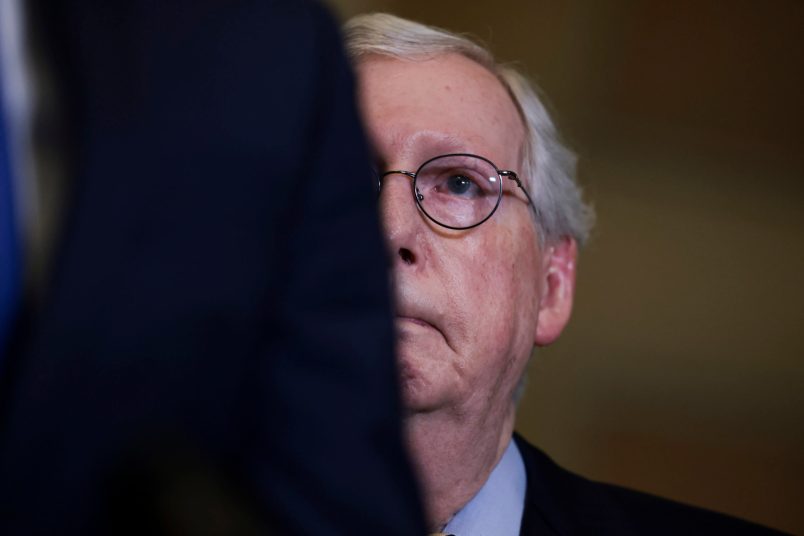Senate Republicans made good on their threat to filibuster a continuing resolution that would have funded the government for a few more months and suspended the debt ceiling through December of next year.
The vote to overcome the filibuster failed, 48 to 50. Senate Majority Leader Chuck Schumer changed his vote to “nay” so he could bring the legislation back up for a vote at a future time.
Senate Minority Leader Mitch McConnell (R-KY) has made his contradictory position clear for weeks: the debt ceiling must be raised and it’s the height of irresponsibility to risk the economic ramifications that would accompany the United States exceeding its borrowing limit — but Republicans will not lift a finger to avert that disaster.
“After today there will be no doubt about which party is working to solve the problems in that face our country and which party is accelerating us toward unnecessarily, avoidable disaster,” Schumer said, speaking on the Senate floor earlier Monday.
Republicans’ refusal to vote for the continuing resolution, Schumer said, would put them “on record deliberately sabotaging our country’s ability to pay the bills and likely causing the first ever default in American history.”
McConnell’s logic has been comically scattershot, seeming to land on the idea that when Democrats control Congress and the White House, it’s their responsibility alone to deal with the debt limit. That Democrats voted with Republicans to address the debt limit multiple times during the Trump administration doesn’t seem to matter.
The reality is, this logic is about as solid as his various excuses for a) holding open a Supreme Court seat under President Obama due to a fairly far off election and then b) filling the late Justice Ruth Bader Ginsberg’s seat mere weeks before another one. He’s doing this because he can and is confident that baked-in factors — the party in control getting the blame, the odious “both-sides” narratives from the Beltway press — will cover his party’s recklessness.
In this case, McConnell is hoping that when Democrats are forced to pass a debt ceiling hike alone through reconciliation, it’ll imperil the multi-trillion dollar package they are currently negotiating and stitching together.
Unless Democrats, uncharacteristically, choose to fight fire with fire here, they’ll have to now figure out how to keep the government’s lights on and address the debt ceiling very quickly. The deadline on the former is this Thursday; the latter is an alarmingly vague time in October.
Republicans have made clear that they are willing to vote for a clean funding bill, so long as they are sticking Democrats with the poison pill of the debt ceiling. Democrats are unwilling to decouple funding from the debt ceiling, since it’s their only point of leverage — but they may have to, unless they’re willing to risk that the public blames Republicans instead of them for a shutdown.
With that out of the way, they’d likely use reconciliation to raise the debt ceiling. The law governing reconciliation allows for three separate bills a year: one for spending, one for taxes and one for the debt ceiling. Experts concur that Democrats can raise the debt limit through reconciliation. (Whether they can suspend it — probably the preference, since they wouldn’t have to risk disingenuous attack ads accusing them of ballooning the debt — or even abolish it entirely is less certain.)
Meanwhile, Democrats are also trying to juggle consolidating the caucus behind both the bipartisan infrastructure plan and the reconciliation package. Nine House moderates set a deadline for the former this week, needlessly intensifying the pressure to get the reconciliation package finalized and the whole broad caucus into agreement.
For McConnell, throwing debt ceiling and government shutdown grenades into Democrats’ heavy lift is so much the better.



